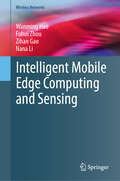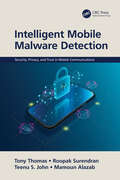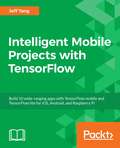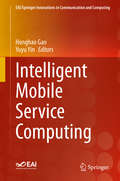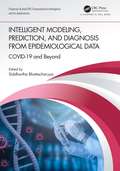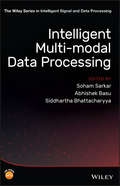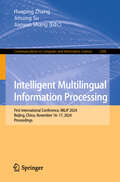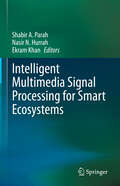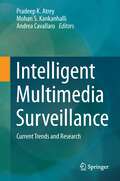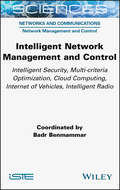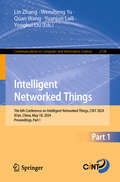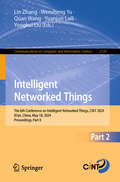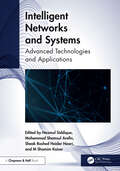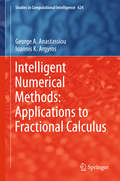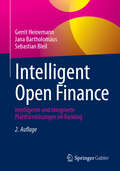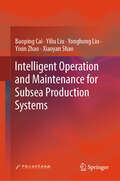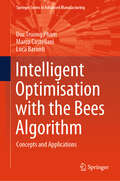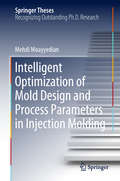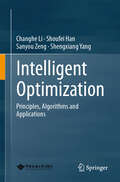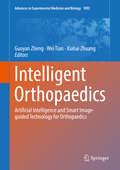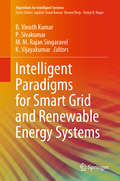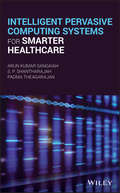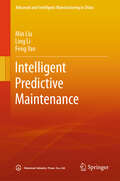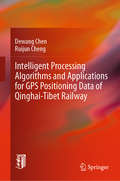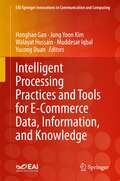- Table View
- List View
Intelligent Mobile Edge Computing and Sensing (Wireless Networks)
by Wanming Hao Fuhui Zhou Zihan Gao Nana LiThe field of edge computing is advancing quickly, with new algorithms, architectures, and use cases emerging regularly. Intelligent mobile edge computing includes various domains—such as IoT, AI, and telecommunications—making it essential to provide a holistic view that bridges these areas for researchers and practitioners. There is a growing need for practical insights and case studies that illustrate how mobile edge computing can be effectively implemented in industries like healthcare, smart cities, and manufacturing. This book aims to tackle real-world challenges, offering strategies for deployment, network structure, resource optimization, beamforming, and so on. This book explores the potential of mobile edge computing in wireless intelligent and sensing environments. This comprehensive guide delves into cutting-edge technologies that enable computing resource optimization and decision-making at the edge or cloud, reducing latency and bandwidth consumption. It provides a comprehensive and accessible resource that addresses the rapidly mobile edge computing related technologies. As the demand for real-time data processing and low-latency applications grows for future 6G wireless communications, this book can help readers to understand the implications, challenges, and opportunities presented by these innovations.
Intelligent Mobile Malware Detection (Security, Privacy, and Trust in Mobile Communications)
by Tony Thomas Mamoun Alazab Roopak Surendran Teenu S. JohnThe popularity of Android mobile phones has caused more cybercriminals to create malware applications that carry out various malicious activities. The attacks, which escalated after the COVID-19 pandemic, proved there is great importance in protecting Android mobile devices from malware attacks. Intelligent Mobile Malware Detection will teach users how to develop intelligent Android malware detection mechanisms by using various graph and stochastic models. The book begins with an introduction to the Android operating system accompanied by the limitations of the state-of-the-art static malware detection mechanisms as well as a detailed presentation of a hybrid malware detection mechanism. The text then presents four different system call-based dynamic Android malware detection mechanisms using graph centrality measures, graph signal processing and graph convolutional networks. Further, the text shows how most of the Android malware can be detected by checking the presence of a unique subsequence of system calls in its system call sequence. All the malware detection mechanisms presented in the book are based on the authors' recent research. The experiments are conducted with the latest Android malware samples, and the malware samples are collected from public repositories. The source codes are also provided for easy implementation of the mechanisms. This book will be highly useful to Android malware researchers, developers, students and cyber security professionals to explore and build defense mechanisms against the ever-evolving Android malware.
Intelligent Mobile Projects with TensorFlow: Build 10+ Artificial Intelligence apps using TensorFlow Mobile and Lite for iOS, Android, and Raspberry Pi
by Xiaofei Jeff" TangCreate Deep Learning and Reinforcement Learning apps for multiple platforms with TensorFlowKey FeaturesBuild TensorFlow-powered AI applications for mobile and embedded devices Learn modern AI topics such as computer vision, NLP, and deep reinforcement learningGet practical insights and exclusive working code not available in the TensorFlow documentationBook DescriptionAs a developer, you always need to keep an eye out and be ready for what will be trending soon, while also focusing on what's trending currently. So, what's better than learning about the integration of the best of both worlds, the present and the future? Artificial Intelligence (AI) is widely regarded as the next big thing after mobile, and Google's TensorFlow is the leading open source machine learning framework, the hottest branch of AI. This book covers more than 10 complete iOS, Android, and Raspberry Pi apps powered by TensorFlow and built from scratch, running all kinds of cool TensorFlow models offline on-device: from computer vision, speech and language processing to generative adversarial networks and AlphaZero-like deep reinforcement learning. You’ll learn how to use or retrain existing TensorFlow models, build your own models, and develop intelligent mobile apps running those TensorFlow models. You'll learn how to quickly build such apps with step-by-step tutorials and how to avoid many pitfalls in the process with lots of hard-earned troubleshooting tips.What you will learn Classify images with transfer learning Detect objects and their locations Transform pictures with amazing art styles Understand simple speech commands Describe images in natural language Recognize drawing with Convolutional Neural Network and Long Short-Term Memory Predict stock price with Recurrent Neural Network in TensorFlow and Keras Generate and enhance images with generative adversarial networks Build AlphaZero-like mobile game app in TensorFlow and Keras Use TensorFlow Lite and Core ML on mobile Develop TensorFlow apps on Raspberry Pi that can move, see, listen, speak, and learnWho this book is forIf you're an iOS/Android developer interested in building and retraining others' TensorFlow models and running them in your mobile apps, or if you're a TensorFlow developer and want to run your new and amazing TensorFlow models on mobile devices, this book is for you. You'll also benefit from this book if you're interested in TensorFlow Lite, Core ML, or TensorFlow on Raspberry Pi.
Intelligent Mobile Service Computing (EAI/Springer Innovations in Communication and Computing)
by Honghao Gao Yuyu YinThis book discusses recent research and applications in intelligent service computing in mobile environments. The authors first explain how advances in artificial intelligence and big data have allowed for an array of intelligent services with complex and diverse applications. They then show how this brings new opportunities and challenges for service computing. The book, made up of contributions from academic and industry, aims to present advances in intelligent services, new algorithms and techniques in the field, foundational theory and systems, as well as practical real-life applications. Some of the topics discussed include cognition, modeling, description and verification for intelligent services; discovery, recommendation and selection for intelligent services; formal verification, testing and inspection for intelligent services; and composition and cooperation methods for intelligent services.
Intelligent Modeling, Prediction, and Diagnosis from Epidemiological Data: COVID-19 and Beyond (Chapman & Hall/CRC Computational Intelligence and Its Applications)
by Siddhartha BhattacharyyaIntelligent Modeling, Prediction, and Diagnosis from Epidemiological Data: COVID-19 and Beyond is a handy treatise to elicit and elaborate possible intelligent mechanisms for modeling, prediction, diagnosis, and early detection of diseases arising from outbreaks of different epidemics with special reference to COVID-19. Starting with a formal introduction of the human immune systems, this book focuses on the epidemiological aspects with due cognizance to modeling, prevention, and diagnosis of epidemics. In addition, it also deals with evolving decisions on post-pandemic socio-economic structure. The book offers a comprehensive coverage of the most essential topics, including: A general overview of pandemics and their outbreak behavior A detailed overview of CI techniques Intelligent modeling, prediction, and diagnostic measures for pandemics Prognostic models Post-pandemic socio-economic structure The accompanying case studies are based on available real-world data sets. While other books may deal with this COVID-19 pandemic, none features topics covering the human immune system as well as influences on the environmental disorder due to the ongoing pandemic. The book is primarily intended to benefit medical professionals and healthcare workers as well as the virologists who are essentially the frontline fighters of this pandemic. In addition, it also serves as a vital resource for relevant researchers in this interdisciplinary field as well as for tutors and postgraduate and undergraduate students of information sciences.
Intelligent Multi-Modal Data Processing (The Wiley Series in Intelligent Signal and Data Processing)
by Siddhartha Bhattacharyya Abhishek Basu Soham SarkarA comprehensive review of the most recent applications of intelligent multi-modal data processing Intelligent Multi-Modal Data Processing contains a review of the most recent applications of data processing. The Editors and contributors – noted experts on the topic – offer a review of the new and challenging areas of multimedia data processing as well as state-of-the-art algorithms to solve the problems in an intelligent manner. The text provides a clear understanding of the real-life implementation of different statistical theories and explains how to implement various statistical theories. Intelligent Multi-Modal Data Processing is an authoritative guide for developing innovative research ideas for interdisciplinary research practices. Designed as a practical resource, the book contains tables to compare statistical analysis results of a novel technique to that of the state-of-the-art techniques and illustrations in the form of algorithms to establish a pre-processing and/or post-processing technique for model building. The book also contains images that show the efficiency of the algorithm on standard data set. This important book: Includes an in-depth analysis of the state-of-the-art applications of signal and data processing Contains contributions from noted experts in the field Offers information on hybrid differential evolution for optimal multilevel image thresholding Presents a fuzzy decision based multi-objective evolutionary method for video summarisation Written for students of technology and management, computer scientists and professionals in information technology, Intelligent Multi-Modal Data Processing brings together in one volume the range of multi-modal data processing.
Intelligent Multilingual Information Processing: First International Conference, IMLIP 2024, Beijing, China, November 16–17, 2024, Proceedings (Communications in Computer and Information Science #2395)
by Jinsong Su Huaping Zhang Jianyun ShangThis CCIS post conference volume constitutes the proceedings of the First International Conference on Intelligent Multilingual Information Processing, IMLIP 2024, in Beijing, China, during November 2024. The 30 full papers presented at IMLIP 2024 were carefully reviewed and selected from 144 submissions. The papers contained in these proceedings address challenging issues in Cross-lingual processing, Large language models, Computational linguistics theory, Resource and corpus construction, Evaluation, Multilingual language understanding, Machine translation, as well as the fundamentals and applications of Multimodal intelligent information processing.
Intelligent Multimedia Signal Processing for Smart Ecosystems
by Shabir A. Parah Nasir N. Hurrah Ekram KhanA smart ecosystem is envisioned to exchange and analyze data across systems, enabling a flexible, faster, and reliable smart ecosystem for high-quality results at reduced costs and little human intervention. This book introduces many innovative approaches and provides solutions to various problems of smart ecosystems designed by employing various techniques/models based on AI, ML, Deep Learning, and the Internet of Things (IoT). The main focus is on intelligent multimedia processing and automated decision-making for various services, real-time data analysis, data security, cost-effective solutions for multimedia applications, smart information processing systems, and smart city planning to name a few. In addition, this book presents some key insights and future directions in the various areas of technology. Throughout the book, many state-of-the-art solutions concerning various applications are proposed to solve the issues and ensure the quality of services (QoS). The authors discuss the limitations of the current techniques used to design a smart ecosystem and highlight some prospective areas of research in the future. The book comprehensively discusses multimedia processing of various forms of data comprising text, images, and audio for the implementation of various solutions. The book is aimed to open many areas of research and thus would present a comprehensive reference for the design of smart ecosystems in various applications.
Intelligent Multimedia Surveillance
by Andrea Cavallaro Pradeep K. Atrey Mohan S. KankanhalliIntelligent multimedia surveillance concerns the analysis of multiple sensing inputs including video and audio streams, radio-frequency identification (RFID), and depth data. These data are processed for the automated detection and tracking of people, vehicles, and other objects. The goal is to locate moving targets, to understand their behavior, and to detect suspicious or abnormal activities for crime prevention. Despite its benefits, there is societal apprehension regarding the use of such technology, so an important challenge in this research area is to balance public safety and privacy. This edited book presents recent findings in the field of intelligent multimedia surveillance emerging from disciplines such as multimedia computing, computer vision, and artificial intelligence. It consists of nine chapters addressing intelligent video surveillance, video analysis of crowds, privacy issues in intelligent multimedia surveillance, RFID technology for localization of objects, object tracking using visual saliency information, estimating multiresolution depth using active stereo vision, and performance evaluation for video surveillance systems. The book will be of value to researchers and practitioners working on related problems in security, multimedia, and artificial intelligence.
Intelligent Network Management and Control: Intelligent Security, Multi-criteria Optimization, Cloud Computing, Internet of Vehicles, Intelligent Radio
by Badr BenmammarThe management and control of networks can no longer be envisaged without the introduction of artificial intelligence at all stages. Intelligent Network Management and Control deals with topical issues related mainly to intelligent security of computer networks, deployment of security services in SDN (software-defined networking), optimization of networks using artificial intelligence techniques and multi-criteria optimization methods for selecting networks in a heterogeneous environment. This book also focuses on selecting cloud computing services, intelligent unloading of calculations in the context of mobile cloud computing, intelligent resource management in a smart grid-cloud system for better energy efficiency, new architectures for the Internet of Vehicles (IoV), the application of artificial intelligence in cognitive radio networks and intelligent radio input to meet the on-road communication needs of autonomous vehicles.
Intelligent Networked Things: The 6th Conference on Intelligent Networked Things, CINT 2024, Xi'an, China, May 18, 2024, Proceedings, Part I (Communications in Computer and Information Science #2138)
by Lin Zhang Quan Wang Yuanjun Laili Wensheng Yu Yongkui LiuThis book constitutes the refereed proceedings of the The 6th Conference on Intelligent Networked Things on Intelligent Networked Things, CINT 2024, held in Xi'an, China, in May 18, 2024. The 51 full papers presented were carefully reviewed and selected from 151 submissions. The conference papers are organized in topical sections on: Part I - Theories and Mathematical Methods for Intelligent Networked Things; Modeling and Simulation in Intelligent Networked Things. Part II - Artificial Intelligence for Intelligent Networked Things; Optimization and Decision in Intelligent Networked Things.
Intelligent Networked Things: The 6th Conference on Intelligent Networked Things, CINT 2024, Xi'an, China, May 18, 2024, Proceedings, Part II (Communications in Computer and Information Science #2139)
by Lin Zhang Quan Wang Yuanjun Laili Wensheng Yu Yongkui LiuThis book constitutes the refereed proceedings of the The 6th Conference on Intelligent Networked Things on Intelligent Networked Things, CINT 2024, held in Xi'an, China, in May 18, 2024. The 51 full papers presented were carefully reviewed and selected from 151 submissions. The conference papers are organized in topical sections on: Part I - Theories and Mathematical Methods for Intelligent Networked Things; Modeling and Simulation in Intelligent Networked Things. Part II - Artificial Intelligence for Intelligent Networked Things; Optimization and Decision in Intelligent Networked Things.
Intelligent Networks and Systems: Advanced Technologies and Applications
by Nazmul Siddique M Shamim Kaiser Mohammad Shamsul Arefin Haider Noori, Sheak RashedIn today’s fast-evolving tech landscape, Intelligent Networks and Systems: Advanced Technologies and Applications explores cutting-edge innovations in intelligent systems and their real-world impact. From smart grids and IoT applications to machine learning-driven network optimization and cybersecurity, this book covers the key technologies shaping modern infrastructure.Balancing technical depth with clear, engaging writing, this book is designed for researchers, industry professionals, and tech enthusiasts alike. It not only unpacks the latest advancements but also examines ethical and regulatory challenges as intelligent networks become more integrated into everyday life.As these technologies continue to transform industries, this book serves as a vital resource for staying ahead. Whether you're looking to deepen your expertise or apply these concepts in practice, this book will guide and inspire your journey into the future of intelligent technology.
Intelligent Numerical Methods: Applications to Fractional Calculus
by George A. Anastassiou Ioannis K. ArgyrosIn this monograph the authors present Newton-type, Newton-like and other numerical methods, which involve fractional derivatives and fractional integral operators, for the first time studied in the literature. All for the purpose to solve numerically equations whose associated functions can be also non-differentiable in the ordinary sense. That is among others extending the classical Newton method theory which requires usual differentiability of function. Chapters are self-contained and can be read independently and several advanced courses can be taught out of this book. An extensive list of references is given per chapter. The book's results are expected to find applications in many areas of applied mathematics, stochastics, computer science and engineering. As such this monograph is suitable for researchers, graduate students, and seminars of the above subjects, also to be in all science and engineering libraries.
Intelligent Open Finance: Intelligente und integrierte Plattformlösungen im Banking
by Gerrit Heinemann Sebastian Bleil Jana BartholomäusDieses Buch beantwortet die Schlüsselfragen, inwiefern Pandemie und Dauerkrisen das Kaufverhalten der Konsumenten in bankenfremden Branchen verändert haben und welche Auswirkungen das auf das Kundengeschäft von Banken und Sparkassen haben wird.Als Booster der digitalen Revolution stellt derzeit die generative KI in Kombination mit neuen EU-Regulierungen den Bankensektor auf den Kopf. Die Payment Services Directive 3 (PSD3) wird die bisherige PSD2 verschärfen und mit einer Payment Services Regulation (PSR) aktualisiert werden. Darüber hinaus wird mit dem Framework for Financial Data Access (FIDA) ein neuer rechtlicher Rahmen für alle Bereiche der Finanzbranche etabliert. Mit der FIDA möchte die EU-Kommission den Datenaustausch jenseits von PSD3/PSR im Sinne von Open Finance ausweiten. Sie ermöglicht Finanzdienstleistern Datenzugriffe auf zusätzliche Datenquellen, wie z. B. Sparkonten, Depots, Hypotheken und Versicherungen bei Wettbewerbern. Dadurch soll der Wettbewerb verstärkt und die Teilnahme von Nichtbanken am Zahlungsverkehr erhöht werden. Dieses bedeutet für die Bankenwelt eine enorme Zäsur. Für die Banken und Sparkassen geht es nunmehr darum, mit einer eigenen wettbewerbsfähigen Plattformlösung zu reagieren. Dabei erhöhen die aktuellen Entwicklungen auf dem Gebiet der generativen KI den Handlungsdruck, da sie effizientere, kundenzentriertere Lösungen ermöglichen. Das Werk liefert Banken bzw. Sparkassen wichtige Handlungsoptionen und unterstützt sie dabei, die in anderen Branchen gemachten Fehler bei der Umsetzung der Plattformökonomie zu vermeiden. Dabei werden die wichtigsten Trends und Entwicklungen aus anderen Branchen aufgezeigt, die für Banken und Sparkassen relevant sind. Dazu zählen vor allem mobile-basierte Plattformmodelle und KI-Anwendungen.
Intelligent Operation and Maintenance for Subsea Production Systems
by Baoping Cai Yonghong Liu Yiliu Liu Yixin Zhao Xiaoyan ShaoThis book systematically explores the challenges and advancements in integrating intelligent technologies with ocean engineering, with a particular focus on three core topics of fault diagnosis, fault prognosis, and maintenance for subsea production systems in harsh environments. It specifically addresses subsea engineering, focusing on the intersection with intelligent technologies in operation and maintenance, and also appeals to scholars and engineers from various disciplines, including Mechanical Engineering, Electrical Engineering, Oil and Gas Production, Reliability Engineering, and other related fields. This book introduces the latest algorithmic models for fault diagnosis, prognosis and maintenance, grounded in advanced methodologies such as big data, digital twin, Bayesian Networks. It features comprehensive figures, detailed tables, and a novel presentation style, making complex research more accessible. Additionally, this book stands out for its systematic approach to integrating cutting-edge methodologies with practical applications, providing practical insights and demonstrating foresight in the field of intelligent operation and maintenance for subsea production systems. The book is intended for graduate students, researchers, practitioners, industry engineers, and maintenance professionals specializing in subsea engineering, marine technology, intelligent systems, oil and gas production systems, and alike.
Intelligent Optimisation with the Bees Algorithm: Concepts and Applications (Springer Series in Advanced Manufacturing)
by Marco Castellani Duc Truong Pham Luca BarontiThis book offers an extensive guide to understanding, implementing, and applying the Bees Algorithm, a powerful nature-inspired optimisation metaheuristic that mimics the foraging behaviour of honey bees. In today's highly interconnected world, systems have become more difficult to optimise. This book addresses the challenge of solving complex optimisation problems efficiently and effectively by drawing inspiration from the remarkable problem-solving abilities observed in nature. The Bees Algorithm provides an elegant, simple, robust, and adaptable approach to navigate the complexities of high-dimensional, multimodal, or time-varying problems that often stymie traditional optimisation methods. This book offers an in-depth exploration of the algorithm, providing a thorough understanding of its underlying principles and mechanisms. It establishes a mathematical framework for the algorithm, facilitating a clearer insight into its behaviour and performance. Through empirical studies and benchmarks, the book demonstrates the algorithm's effectiveness across a range of optimisation problems. Additionally, it showcases practical applications of the Bees Algorithm in diverse fields such as engineering design, robotics, and manufacturing. Finally, it discusses the latest developments and variants of the algorithm, highlighting its potential for future research and innovation. With its accessible style and step-by-step guidance, this book equips readers—be they researchers, practitioners, or students in computer science, engineering, or optimisation—with the knowledge and tools to leverage the principles of swarm intelligence and biomimicry to solve the real-world optimisation challenges of the new industrial age.
Intelligent Optimization of Mold Design and Process Parameters in Injection Molding (Springer Theses)
by Mehdi MoayyedianThis book describes an effective framework for setting the right process parameters and new mold design to reduce the current plastic defects in injection molding. It presents a new approach for the optimization of injection molding process via (i) a new mold runner design which leads to 20 percent reduction in scrap rate, 2.5 percent reduction in manufacturing time, and easier ejection of injected part, (ii) a new mold gate design which leads to less plastic defects; and (iii) the introduction of a number of promising alternatives with high moldability indices. Besides presenting important developments of relevance academic research, the book also includes useful information for people working in the injection molding industry, especially in the green manufacturing field.
Intelligent Optimization: Principles, Algorithms and Applications
by Shengxiang Yang Sanyou Zeng Changhe Li Shoufei HanThis textbook comprehensively explores the foundational principles, algorithms, and applications of intelligent optimization, making it an ideal resource for both undergraduate and postgraduate artificial intelligence courses. It remains equally valuable for active researchers and individuals engaged in self-study. Serving as a significant reference, it delves into advanced topics within the evolutionary computation field, including multi-objective optimization, dynamic optimization, constrained optimization, robust optimization, expensive optimization, and other pivotal scientific studies related to optimization. Designed to be approachable and inclusive, this textbook equips readers with the essential mathematical background necessary for understanding intelligent optimization. It employs an accessible writing style, complemented by extensive pseudo-code and diagrams that vividly illustrate the mechanisms, principles, and algorithms of optimization. With a focus on practicality, this textbook provides diverse real-world application examples spanning engineering, games, logistics, and other domains, enabling readers to confidently apply intelligent techniques to actual optimization problems. Recognizing the importance of hands-on experience, the textbook introduces the Open-source Framework for Evolutionary Computation platform (OFEC) as a user-friendly tool. This platform serves as a comprehensive toolkit for implementing, evaluating, visualizing, and benchmarking various optimization algorithms. The book guides readers on maximizing the utility of OFEC for conducting experiments and analyses in the field of evolutionary computation, facilitating a deeper understanding of intelligent optimization through practical application.
Intelligent Orthopaedics: Artificial Intelligence And Smart Image-guided Technology For Orthopaedics (Advances in Experimental Medicine and Biology #1093)
by Guoyan Zheng Xiahai Zhuang Wei TianThis book introduces readers to the latest technological advances in the emerging field of intelligent orthopaedics. Artificial intelligence and smart instrumentation techniques are now revolutionizing every area of our lives, including medicine. The applications of these techniques in orthopaedic interventions offer a number of potential benefits, e.g. reduced incision size and scarring, minimized soft tissue damage, and decreased risk of misalignment. Consequently, these techniques have become indispensable for various orthopaedic interventions, which has led to the emerging field of intelligent orthopaedics. Addressing key technologies and applications, this book offers a valuable guide for all researchers and clinicians who need an update on both the principles and practice of intelligent orthopaedics, and for graduate students embarking on a career in this field.
Intelligent Paradigms for Smart Grid and Renewable Energy Systems (Algorithms for Intelligent Systems)
by P. Sivakumar K. Vijayakumar B. Vinoth Kumar M. M. Rajan SingaravelThis book addresses and disseminates state-of-the-art research and development in the applications of intelligent techniques for smart grids and renewable energy systems. This helps the readers to grasp the extensive point of view and the essence of the recent advances in this field. The book solicits contributions from active researchers which include theory, case studies and intelligent paradigms pertaining to the smart grid and renewable energy systems. The prospective audience would be researchers, professionals, practitioners and students from academia and industry who work in this field.
Intelligent Pervasive Computing Systems for Smarter Healthcare
by Arun Kumar Sangaiah S.P. Shantharajah Padma TheagarajanA guide to intelligent decision and pervasive computing paradigms for healthcare analytics systems with a focus on the use of bio-sensors Intelligent Pervasive Computing Systems for Smarter Healthcare describes the innovations in healthcare made possible by computing through bio-sensors. The pervasive computing paradigm offers tremendous advantages in diversified areas of healthcare research and technology. The authors—noted experts in the field—provide the state-of-the-art intelligence paradigm that enables optimization of medical assessment for a healthy, authentic, safer, and more productive environment. Today’s computers are integrated through bio-sensors and generate a huge amount of information that can enhance our ability to process enormous bio-informatics data that can be transformed into meaningful medical knowledge and help with diagnosis, monitoring and tracking health issues, clinical decision making, early detection of infectious disease prevention, and rapid analysis of health hazards. The text examines a wealth of topics such as the design and development of pervasive healthcare technologies, data modeling and information management, wearable biosensors and their systems, and more. This important resource: Explores the recent trends and developments in computing through bio-sensors and its technological applications Contains a review of biosensors and sensor systems and networks for mobile health monitoring Offers an opportunity for readers to examine the concepts and future outlook of intelligence on healthcare systems incorporating biosensor applications Includes information on privacy and security issues on wireless body area network for remote healthcare monitoring Written for scientists and application developers and professionals in related fields, Intelligent Pervasive Computing Systems for Smarter Healthcare is a guide to the most recent developments in intelligent computer systems that are applicable to the healthcare industry.
Intelligent Predictive Maintenance (Advanced and Intelligent Manufacturing in China)
by Ling Li Min Liu Feng YanIn the field of equipment/product operation and maintenance (O&M) services, the new generation of information technologies such as the internet, big data, and artificial intelligence are deeply integrated with O&M services to form an internet-based Maintenance Repair & Operation (MRO) service network and an intelligent service environment. To deal with the uncertainties of multiple collaborative entities and highly random equipment failures in the large-scale MRO network, this book establishes the theory, technology, and methods of Intelligent Predictive Maintenance (IPdM) for the MRO service network through the study of high-quality acquisition and integration of multi-source heterogeneous data, data-driven equipment fault diagnosis and prediction, large-scale maintenance decision-making, feedback, and control. The book systematically elaborates on the emerging theories, technologies, and methods in the field of equipment/product O&M services, covering a wide range of topics with rich contents. It emphasizes both systematic and scientific approaches as well as practicality. It offers both comprehensive and specialized discussions to reflect the strategic deployment and implementation of China's new generation of intelligent manufacturing and artificial intelligence in this field. The basis of English translation of this book, originally in Chinese, was facilitated by artificial intelligence. The content was later revised by the author for accuracy.
Intelligent Processing Algorithms and Applications for GPS Positioning Data of Qinghai-Tibet Railway
by Dewang Chen Ruijun ChengTaking the Qinghai–Tibet Railway as an example, this book introduces intelligent processing for Global Positioning Data (GPS) data. Combining theory with practical applications, it provides essential insights into the Chinese Qinghai–Tibet Railway and novel methods of data processing for GPS satellite positioning, making it a valuable resource for all those working with train control systems, train positioning systems, satellite positioning, and intelligent data processing. As satellite positioning guarantees the safe and efficient operation of train control systems, it focuses on how to best process the GPS data collected, including methods for error detection, reduction and information fusion.
Intelligent Processing Practices and Tools for E-Commerce Data, Information, and Knowledge (EAI/Springer Innovations in Communication and Computing)
by Honghao Gao Muddesar Iqbal Jung Yoon Kim Walayat Hussain Yucong DuanThis book discusses recent research and applications about intelligent processing practices and tools for e-commerce data, information and knowledge. The authors first explain how advances in intelligent processing of data, information and knowledge that has wildly been used in e-commerce applications. They then show how this brings new opportunities and challenges for processing e-commerce data, information and knowledge. The book, made up of contributions from both academia and industry, aims to present advances in artificial intelligence to collect, process, and mining Data, information and knowledge, such as new algorithms and techniques in the field, foundational theory and systems, as well as practical e-commerce applications. Some of the topics discussed include AI for e-commerce, such as machine learning, deep learning; personalized service recommendation to e-commerce; modeling, description, and verification for data, information and knowledge; and task scheduling and performance optimization for large-scale concurrency.
